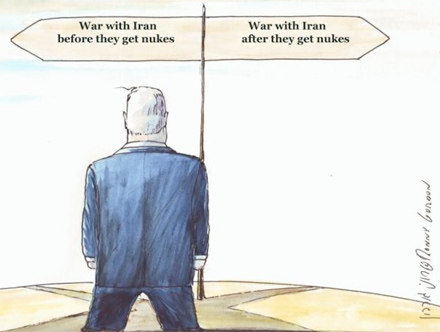
Unilateral preemptive war of aggression has and continues to be futile not only for the American’s long term strategic interest, but also because it devastates the people inflicted with such catastrophe. Therefore, preemptive war must never occur, or be the every last option on the table, and after all other alternatives are exhaustively probed.
After the “Arab uprising” of 2011, Iran has once again moved back to the very top of Western/American diplomacy agenda because of Iran’s alleged development of nuclear technology. This policy shift is primarily driven by Israel and its staunch lobbying conglomerates in the U.S. and the West.
Israel is a young country, most likely possessing no less than 200-300 nuclear bombs while it has remained elusively non-signatory to IAEA non-proliferations and NPT treaties. As antagonistic as Israel and the unpopular Arab governments may seem on the surface as odd bedfellows, they share a united approach in distracting their disgruntled public opinions by diverting attention to Iran.
The excruciating fact that the Islamic Republic in Iran (IRI) has persistently violated human rights, democratic principles, and trampled its rich natural and diverse human resources for the past thirty-three years has never been part of the American/Western and Israeli/Arab strategic equations of how to deal with Iran.
The military industrial complex as the late President Dwight Eisenhower [rightly] referred to it, in cooperation with the neoconservatives, the Israeli and the Saudi lobbying infrastructures, are once again orchestrating to wage another war against Iran. In doing so, they hope for a much shorter but heavier war in intensity, with the aim of benefiting from the spoils of such a war soon thereafter.
As the saber-rattling has ratcheted up, it has already destabilized Iran and the daily lives of its ordinary citizens as evident by the economic bleeding and monetary fluctuations, massive inflation and above all extreme repression of human and constitutional rights under bogus national security policies.
Much broader and harsher sanctions, oil embargo, more strict travel restrictions, freezing of assets of the IRI government officials and the banking system outside the country, and the mass mobilizations of the American navy and the armed forces in the Persian Gulf, seem to pave the way for this possible unilateral massive military aggression against Iran.
After having spent trillions of tax payer dollars and enduring the painful loss of several thousand American and allied forces in Afghanistan and Iraq (while the loss of life and capital is a thousand fold larger in those countries), one can only wonder whether these latter counties are better off today, or whether the American’s strategic interests are better served now; All indications point to the opposite conclusion.
Undoubtedly, no one can question the merit and the long overdue need for the 80 million Iranians to achieve their aspirations for homegrown modernization and democratization. Freedom, reforms, transparency, security, due process and the rule of law, unity and equality, sovereignty, justice and peace, are yearnings which Iranians, a proud diverse nation several thousand years in the making, have struggled for the past 150 years.
The far more urging question is how such hallmarks of a nation would be impacted if and when the current military threats, followed with military strikes against Iran, materialize.
If such military action is primarily carried through remote air and navy precision surgical strikes in a narrow window of time of about a month in order to eliminate the political linchpins and key military and sensitive economic infrastructures of the Islamic Republic machinery and pave the way for a sovereign political reform process, it is highly likely that the majority of people of Iran would stand on the sidelines or even some become ecstatic with the prospect of the failed regime fallen into the dust bin of history.
However, if such military action is stretched over time, and/or involves physical occupation, or worse yet if the U.S. & its allies strike civilian targets, or attempt to provoke internal ethnic factions to wage a civil war quagmire, this would leave little option for the majority of Iranians but to reluctantly rise and support the current regime in order to ensure the sovereignty of the nation and its regional future in the family of nations is indeed conserved; This was self-evident during the Iran-Iraq [imposed] war that lasted for eight years while up to a million Iranians, many of whom not necessarily pro-regime, perished to ensure the country’s sovereignty and its territorial integrity and honor were sustained.
Paradoxically, there is no viable organized political infrastructure and leadership accepted by many Iranians to fill the vacuum and prepare the nation for a homegrown democratic transition. This is due to the elimination of viable political forces through mass executions, tortures and imprisonment by the current and past regimes, involuntary exile of millions of Iranians now in the Diaspora, and the lack of freedom inside the country for intellectual discourse and organizing, ironically, to take root over the past century.
It is understandably regretful to witness the missed past opportunities and the trepidation felt by Israel for not having fully reached a comprehensive security and peace accord with the Palestinian and the Arab nations. This was once quite plausible, but, it has now become improbable if not impossible due to Israeli’s endemic intransigence and the Arab uprisings that have yielded unstable and thus indecisively non-committal regimes throughout the Arab world.
If Israel is to sustain itself as a sovereign nation, and be respected and accepted by others in the long run, it must not infringe upon the sovereignty and legitimate aspirations of Iranians in particular, a historic nation with whom the Jewish people possess commonalities since antiquity. And, if the Israelis assume that by flexing their military might against Iran that they could leverage their hegemony over this nation or the region, they would be resolutely proven wrong.
The people of Iran poured into the streets with candlelight vigil after the despicable terrorist act of September 11, and despite their government struggling to quench such spontaneous grassroots expression of love for humanity. The Americans should make sure the American interests remain balanced with the long-term sovereignty of Iran and the aspirations of the Iranian people.
The U.S. and its allies should warn/dissuade against any unilateral measures or indirect military actions by Israel or the Arab proxies that might once again unite the Iranians against external aggressions. This would bolster the repressive IRI reactions inside the country and the intransigently belligerent rhetoric of regime. The U.S. must carefully assess every policy toward Iran to ensure that history will for the first time record the U.S. on the righteous side of serving justice, sustaining tranquility and peace for Iran and this historically important area of the world.
AUTHOR
Freeman Ure (Ph.D. Bakersfield, California) is a university professor and independent thinker of Iranian multi-ethnic heritage who has taught and resided in the U.S. since the late 70’s. (freemanurephd@gmai.com)






